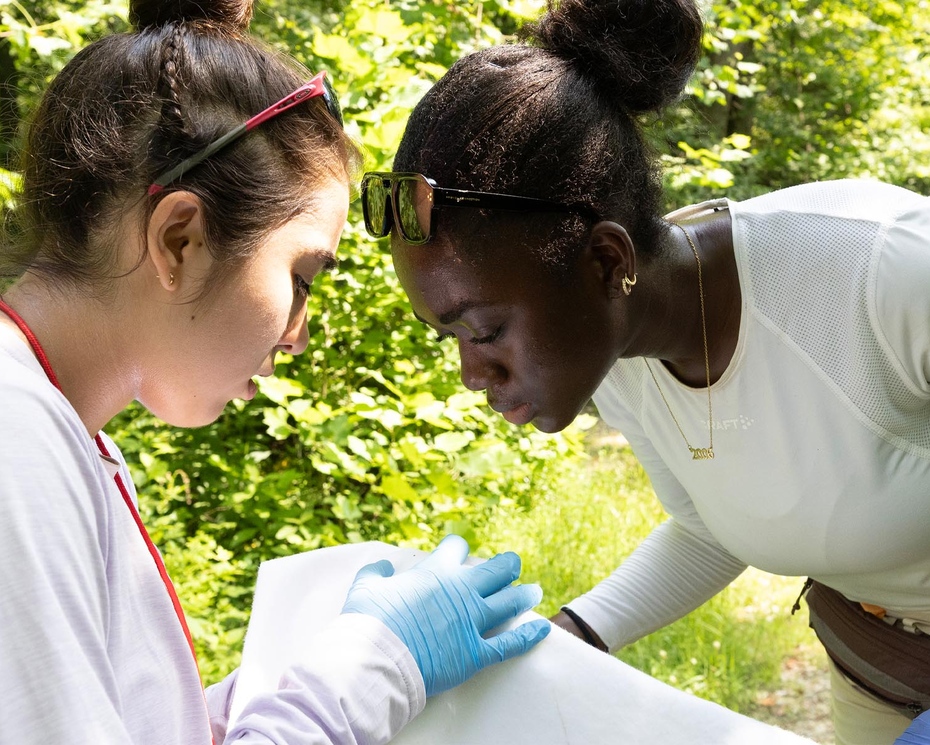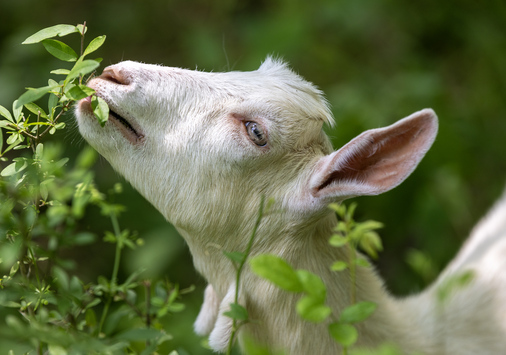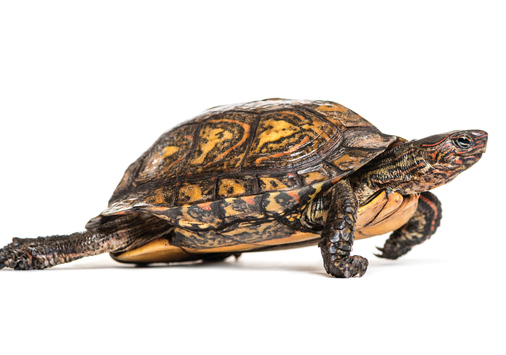Degree Requirements
Biology Major
Students can pursue either a B.A. or B.S. degree in Biology (distinctions between the two degrees are outlined below). For either degree, students should aim to complete the three Biology core courses by the end of their second year. Students who have completed comparable coursework at other accredited institutions may petition to have such courses transferred to Denison and credited toward the major, at the department's discretion. In contrast, students with credit-earning scores on Advanced Placement (4 or 5) or International Baccalaureate (6 or 7) tests in Biology will be granted academic credit for BIOL 199, but typically will be required to complete all three core courses in the major.
Bachelor of Arts in Biology
The requirements for the Bachelor of Arts in Biology include a total of ten courses:
Three core courses
Majors must achieve a grade point average of 2.0 or higher across the three core courses upon completion of the core sequence, see below, before proceeding to 300-level elective courses. Students who do not meet the GPA requirement must repeat one or more core courses to achieve the standard; the highest grade awarded for any repeated core course will be exclusively used in calculating the “biology core GPA”, but all biology grades will be used to calculate the overall major GPA for graduation, as per university policy. This policy applies only to students pursuing a biology major; it does not apply to students pursuing the biology minor or other non-biology degrees.
| Code | Title |
|---|---|
| BIOL 210 | Molecular Biology and Unicellular Life |
| BIOL 220 | Multicellular Life |
| BIOL 230 | Ecology and Evolution |
One year of introductory-level chemistry
The major requires two semesters of introductory-level chemistry (CHEM 131 and CHEM 132 grades of C or better are strongly recommended).
| Code | Title |
|---|---|
| CHEM 131 | Atoms and Molecules: Structure and Dynamics (must be completed before undertaking 300-level electives) |
| CHEM 132 | Organic Structure and Reactivity (can be taken concurrently with 300-level electives) |
Five 300-level biology courses
One of the 300-level biology courses must be designated as a "biological diversity" course. (see the "Additional Points of Interest" section below). Students are encouraged to consult with an advisor in the Biology Department to select the most appropriate suite of advanced courses.
Biology Assessments
Students must satisfactorily complete BIOL 300 (core curriculum assessment exam taken during the term immediately following completion of the biology core) and BIOL 301 (senior writing assessment and survey; administered during the final semester before graduating) to fulfill the requirements for the degree.
| Code | Title |
|---|---|
| BIOL 300 | Biology Assessment I |
| BIOL 301 | Biology Assessment II |
Bachelor of Science in Biology
The requirements for the Bachelor of Science degree in Biology include a total of fourteen courses:
Three core courses
Majors must achieve a grade point average of 2.0 or higher across the three core courses upon completion of the core sequence, see below, before proceeding to 300-level elective courses. Students who do not meet the GPA requirement must repeat one or more core courses to achieve the standard; the highest grade awarded for any repeated core course will be exclusively used in calculating the “biology core GPA”, but all biology grades will be used to calculate the overall major GPA for graduation, as per university policy. This policy applies only to students pursuing a biology major; it does not apply to students pursuing the biology minor or other non-biology degrees.
| Code | Title |
|---|---|
| BIOL 210 | Molecular Biology and Unicellular Life |
| BIOL 220 | Multicellular Life |
| BIOL 230 | Ecology and Evolution |
One year of introductory-level chemistry
The major requires two semesters of introductory-level chemistry (CHEM 131 and CHEM 132 grades of C or better are strongly recommended).
| Code | Title |
|---|---|
| CHEM 131 | Atoms and Molecules: Structure and Dynamics (must be completed before undertaking 300-level electives) |
| CHEM 132 | Organic Structure and Reactivity (can be taken concurrently with 300-level electives) |
Five 300-level biology courses
One of the 300-level biology courses must be designated as a "biological diversity" course (see the "Additional Points of Interest" section below). Students are encouraged to consult with an advisor in the Biology Department to select the most appropriate suite of advanced courses.
Four "Science Cognate" courses.
The science cognate requirement is the lone distinction between the B.A. and B.S. degrees, serving as a means for B.S. majors to become more broadly trained in the sciences. Any non-biology course within the science division will count toward this requirement, as will any environmental studies (ENVS) or Sustainability & Environmental Studies (SES) science course, or Applied Anatomy HESS 202. Students are encouraged to select courses that “do” science, such as classes that include laboratory sections. No more than two courses within a single department or program can be used to fulfill this requirement (note that CHEM 131 and CHEM 132 do not count toward the cognate requirement, nor do they count toward the "two courses per department" stipulation).
Biology Assessments
Students must satisfactorily complete BIOL 300 (core curriculum assessment exam taken during the term immediately following completion of the biology core) and BIOL 301 (senior writing assessment and survey; administered during the final semester before graduating) to fulfill the requirements for the degree.
| Code | Title |
|---|---|
| BIOL 300 | Biology Assessment I |
| BIOL 301 | Biology Assessment II |
Biology Minor
The requirements for the Biology Minor include a total of seven courses:
Three core courses
| Code | Title |
|---|---|
| BIOL 210 | Molecular Biology and Unicellular Life |
| BIOL 220 | Multicellular Life |
| BIOL 230 | Ecology and Evolution |
One semester of introductory chemistry
| Code | Title | |
|---|---|---|
| CHEM 131 | Atoms and Molecules: Structure and Dynamics | |
| or CHEM 132 | Organic Structure and Reactivity | |
| This requirement must be completed prior to undertaking 300-level electives. | ||
Three 300-level biology courses
One of the 300-level biology courses must be designated as a "biological diversity" course (see the "Additional Points of Interest" section below).
Additional Points of Interest
Biological Diversity Courses
Courses that fulfill the biological diversity requirement emphasize the importance of scientific studies at the level of the whole organism. In these courses students gain a holistic perspective on the study of organisms, explore a variety of living forms through a broad survey of taxa, and evaluate the role of phylogenetic history in taxonomy. Students also use careful observation to learn morphology and diagnostic traits, identify organisms into meaningful taxonomic units, and learn the principles of scientific nomenclature. The biological diversity courses that are regularly offered include:
| Code | Title |
|---|---|
| BIOL 308 | Biodiversity Through Time |
| BIOL 312 | Herpetology |
| BIOL 313 | Vertebrate Zoology |
| BIOL 317 | Diversity of Microorganisms |
| BIOL 320 | Plant Systematics |
| BIOL 326 | Plant Evolution and Reproduction |
| BIOL 327 | Biology of Insects |
| BIOL 336 | Invertebrate Zoology |
Senior Research and Directed Studies
BIOL 452 may be counted as a 300-level course, however BIOL 361, BIOL 362, BIOL 363, BIOL 364, and BIOL 451 may not count as 300-level advanced courses toward the requirements for the major or minor.
Medical School Preparation
Biology majors preparing for medical school or most graduate programs are additionally advised to take the following courses:
| Code | Title | |
|---|---|---|
| CHEM 251 & CHEM 258 | Intermediate Organic Chemistry and Intermediate Biochemistry | |
| PHYS 121 & PHYS 122 | General Physics I and General Physics II | |
| MATH 130 | Essentials of Calculus | |
| MATH 135 | Single Variable Calculus | |
| or MATH 145 | Multivariable Calculus | |
| or MATH 120 | Elements of Statistics | |
| These courses can count toward the "science cognate" requirement that is part of the B.S. degree (see above). | ||
Off-Campus Study
Students may complement their major in biology through off-campus study. Denison University is a member of several consortia that offer course credit through off-campus programs. Those with course offerings relevant to Biology students include:
- the School for Field Studies,
- the Organization of Tropical Studies,
- the Duke University Marine Laboratory,
- the Semester in Environmental Science,
- the Oak Ridge National Laboratory,
- the Institute for Study Abroad,
- Denmark's International Study Program, and
- the Associated Colleges of the Midwest Wilderness Field Station.
The Department of Biology is committed to awarding credit for courses offered through these programs that provide a sufficient focus on biological concepts and methods (lecture and laboratory). With prior approval from the department, a maximum of two off-campus courses may be counted toward the requirements of the major. The Richard C. and Linda G. Seale Scholarship provides support to qualified Denison students for participation in summer courses at the Duke University Marine Laboratory. Financial aid may be available for other off-campus programs.
General Education Credit in Biology
Students receive a lab science general education requirement by completing nearly any course offered by the Biology Department. While the 200-level courses are generally recommended for Biology and related majors, non-majors are welcome to take the initial biology major core course (BIOL 210), and they can also consider taking one of our non-majors courses. The various versions of Modern Topics in Biology (BIOL 100: lab science GE; BIOL 103: lab science and quantitative reasoning GE), and BIOL 110 (lab science GE and oral communication GE) are designed for students to explore scientific inquiry and biological concepts through specific topics in the instructor's area of expertise. In addition, students who have had extensive biology training in secondary school may petition the Biology department for BIOL 100 credit without General Education credit. However, such petitions must be made before the completion of the student's third year at Denison.
Advanced Placement
Students with credit-earning scores on Advanced Placement (4 or 5) or International Baccalaureate (6 or 7) tests in Biology will be granted academic credit for BIOL 199. However, as noted above, students granted such AP/IB credit typically will be required to complete all three major core courses for the major.
Biology and Computational Science
Students with an interest in both Biology and Computational Science may pursue a major in Biology with a concentration in Computational Science. Students interested in this option should refer to the description of the Computational Science concentration in the Computer Science section of the catalog, and should consult with a faculty member early in planning their Denison curriculum.
Biology and Environmental Studies
Students with an interest in both Biology and Environmental Studies may pursue a major in Biology with a minor in Environmental Studies, or a major in Environmental Studies with a concentration in biology. Students are advised to choose the program path that best suits their post-graduate goals, and to seek early consultation with faculty in Biology and/or Environmental Studies. Specifics regarding these options can be found in the Environmental Studies section of the catalog.
Biology and Neuroscience
Students with an interest in both Biology and Neuroscience may pursue a major in Biology with a concentration in Neuroscience. Students interested in this option should consult with a Neuroscience faculty member early in their career. Specifics regarding this concentration can be found in the Neuroscience section of the catalog.













